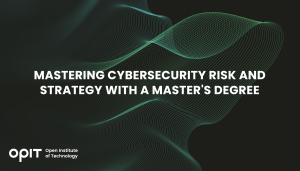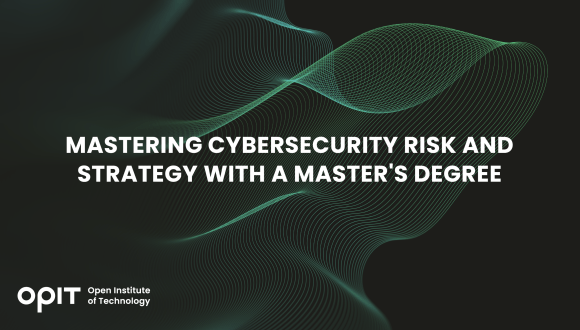

The world has become interconnected by technology and information. The vast amount of data available to companies has also made it increasingly evident that it needs to be stored and protected. It’s no surprise that there are around 2,300 cyberattacks daily, and that number is only expected to rise, seeing that 2023 saw over 70% more attacks than 2021.
These statistics open the door for valuable employment opportunities for specialists in cybersecurity and risk strategy. A cybersecurity expert in Germany can earn between €58k and €85k per year, and the wages in the U.S. are even higher.
Cybersecurity is a relatively vast field that requires both broad IT and management knowledge, but also dedicated experience that correlates to particular job postings. That makes cybersecurity experts difficult to find, as evidenced by the fact that Indeed currently has around 13,000 positions related to the industry.
If you’re already working in IT or planning an IT career, obtaining a master of science in cybersecurity and risk strategy can help you secure a lucrative position.
Understanding Cybersecurity Risk and Strategy
Cybersecurity risk and strategy analyzes the potential for attacks and creates proactive and reactive defenses against them. A complete risk and strategy outline must include all the potential consequences of an attack, such as financial, reputation, and operational losses. In general, a cybersecurity risk and strategy expert will do the following:
- Identify vulnerabilities in the system, whether they come from technical aspects (improper password storage) or human factors (susceptibility to phishing).
- Outline risk factors and the possible rates of attack.
- Create proactive measures, such as implementing more robust security protocols or training personnel on safe online practices.
- Detect attacks once they do come through via intrusion detection systems or other benchmarks.
- Coordinate efforts to contain and remove threats and recover lost data or funds.
A cybersecurity specialist needs to have expert knowledge in various technologies but also solid interpersonal and psychological skills. That’s why a dedicated master’s degree in cybersecurity can help create a complete skillset for the role.
The Curriculum of a Master’s in Cybersecurity Risk and Strategy
A master’s degree in cybersecurity builds upon the IT essentials from a dedicated bachelor’s program. As such, it will likely cover the following:
- Cryptography
- Secure coding practices
- Operating system security
- Network security
- Penetration testing
- Vulnerability assessment
- Government and national cybersecurity
- Ethics, governance, and law implications of cybersecurity
- Systems and security management
- Incident response tactics
However, even more importantly, a good master’s degree program must provide real-life practice assessments. It will allow students to apply the theoretical knowledge and gain valuable experience throughout the curriculum.
Thankfully, online learning has made this type of approach more accessible. Since cybersecurity is web-related by nature, online courses can give students the full breadth of experience and provide more opportunities for a holistic understanding of the subjects and how cybersecurity advances globally.
Take the OPIT Master’s Degree in Enterprise Cybersecurity as a perfect example of this concept. It’s an online-first master’s program that delves deep into cybersecurity concepts such as network security and intrusion detection, cryptography, and even AI in cybersecurity and systems management. Furthermore, students can sign up for practical internships with some of the industry leaders in data management and cybersecurity systems.
Career Outcomes With a Master’s in Cybersecurity
Since IT is a versatile industry, cybersecurity is no different. Students who obtain a master’s degree in this field can have a slew of openings available to them. Entry-to-mid-level roles include:
- Security engineer: In charge of designing, implementing, and maintaining security protocols.
- Penetration tester: Designs programs that ethically hack into existing systems to uncover exploits and vulnerabilities so they can be patched before malicious hackers can reveal them.
- Security analyst: Analyzes information provided by security systems to uncover possible threats and assist other cybersecurity roles.
Mid-to-senior level roles include:
- Security system architect: Designs and implements secure IT infrastructures. Architects can specialize in one specific sub-field, such as cloud, network, or local systems engineering.
- Security manager: In charge of an entire organization’s security systems and implementation.
- Threat response manager: Directly responsible for minimizing the consequences of an active threat or incident.
- Cybersecurity compliance officer: Ensures that the company follows the most recent ethical and legal standards in implementing proactive measures.
- Chief information security officer (CSO or CISO): A leadership position for broad cybersecurity management in larger corporations.
The Online Advantage: Pursuing Your Master’s at OPIT
If you’re interested in a career in cybersecurity, you might have been discouraged to find expensive or prohibitive local colleges. While in-person lessons have their merits, not all colleges are created equal and provide modern knowledge and practice to sharpen students’ skills and prepare them for work.
That’s why OPIT has designed an all-online master’s degree in enterprise cybersecurity. It’s a fully accredited three-term course providing broad and relevant knowledge in modern cybersecurity mechanics.
However, what sets OPIT apart from traditional online degrees is its close relationship with industry leaders. This is emphasized by the complete support from the institution staff and a close-knit community from its digital campus. The courses are a mixture of pre-recorded content that students gain full access to as well as live classes with guests from companies that can share their experience with cybersecurity measures.
As such, OPIT focuses on teaching students relevant skills and how to apply them in real-world situations. Additionally, the course doesn’t have a final exam but provides periodic assessments through projects and assignments to ensure what you learn sticks.
The master’s degree can last between 12 and 18 months, depending on whether you want to take the classes at an accelerated rate. The admission cost is €6,750, with discounts if you apply and pay the entire fee early. The application process is fully online. You need a background in STEM or a bachelor’s degree in a relevant field and be proficient in English.
Becoming a Leader in Cybersecurity
Ultimately, the aim of a master’s degree is to provide students with relevant skills and experience to advance in their careers (or make a significant change).
Apart from teaching technical subjects, the degree focuses on creating situations where students have to apply critical thinking. As mentioned, modern cybersecurity has a significant human factor, so students will also need to develop their interpersonal and management skills if they want to advance to senior-level roles.
OPIT’s master program allows students to partake in interactive projects that will test their newfound knowledge and allow them to flourish in controlled environments with full support from the faculty. This will help reinforce their knowledge and allow them to be more adaptable in the future.
Learn From the Best With OPIT
Since cybersecurity is a rapidly-advancing industry with extreme potential for growth, prospective IT specialists need to be proactive with their learning. Online courses such as OPIT’s master’s degree in enterprise cybersecurity provide all the relevant skills and experience to create a foothold for a successful career in the industry.
Take the next step in your career and upskill yourself with OPIT. Click here to learn more and apply.
Have questions?
Visit our FAQ page or get in touch with us!
Write us at +39 335 576 0263
Get in touch at hello@opit.com
Talk to one of our Study Advisors
We are international
We can speak in:




